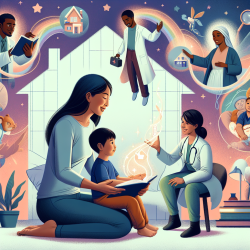Unlocking the Magic of Parent-Led Medical Home Models
In the ever-evolving landscape of healthcare, the Patient-Centered Medical Home (PCMH) model has emerged as a beacon of hope for delivering comprehensive and coordinated care, especially for children with special healthcare needs. A recent study titled A parent-led, patient-centered medical home model instruction for interprofessional undergraduate and graduate learning opportunities sheds light on an innovative approach that bridges the gap between theoretical knowledge and practical application.
The Essence of the PCMH Model
The PCMH model is designed to provide holistic care that is accessible, patient-centered, continuous, comprehensive, coordinated, compassionate, and culturally effective. However, implementing this model can be challenging due to the complexities involved in coordinating care across multiple disciplines and settings.
Project DOCC: A Parent-Led Initiative
Project Delivery of Chronic Care (DOCC) is a pioneering curriculum developed by parents of children with chronic illnesses. It aims to educate healthcare professionals by incorporating the invaluable perspectives of parents. The study highlights the adaptation of this curriculum to fit rural settings, emphasizing the importance of team-based learning and parent mentorship.
Key Findings from the Study
- Increased Learner Knowledge: Participants showed significant improvement in their understanding of PCMH elements and their roles within the model.
- Enhanced Parent-Provider Communication: Parent mentors reported a greater understanding and appreciation from providers.
- Feasibility in Rural Settings: The adapted curriculum proved effective in rural healthcare education, utilizing minimal resources.
Implications for Practitioners
For practitioners looking to enhance their skills, integrating the principles of the PCMH model into practice is crucial. Here are some actionable steps:
- Embrace Team-Based Learning: Collaborate with colleagues across disciplines to provide comprehensive care.
- Engage with Parent Mentors: Involve parents in the care process to gain insights into patient needs and improve communication.
- Focus on Continuous Improvement: Regularly update your knowledge and skills through workshops and training sessions.
Encouraging Further Research
While the study provides valuable insights, there is a need for further research to explore the long-term impact of parent-led medical home models on patient outcomes. Practitioners are encouraged to delve deeper into this area and contribute to the growing body of knowledge.
To read the original research paper, please follow this link: A parent-led, patient-centered medical home model instruction for interprofessional undergraduate and graduate learning opportunities.










